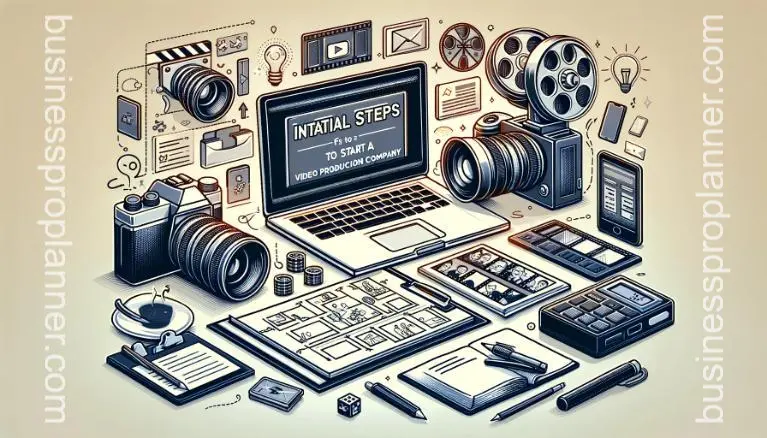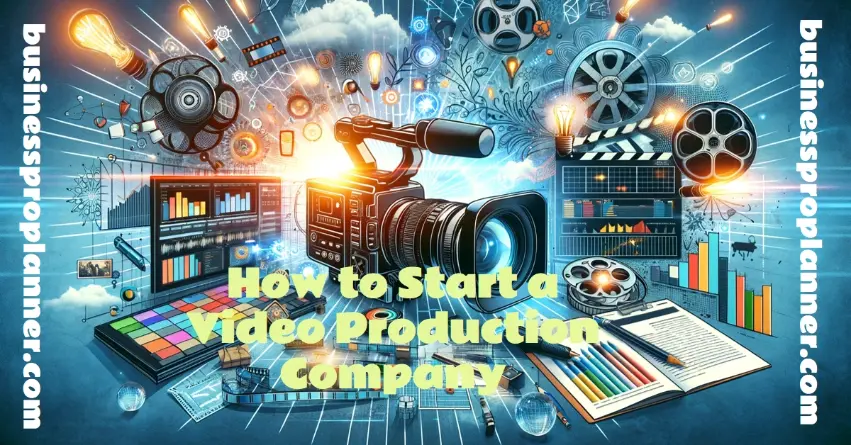Introduction
In an era where visual storytelling reigns supreme, start a video production company offers an exhilarating blend of creativity and entrepreneurship. This 2024, the landscape of video production companies has evolved, demanding not just skill in videography but also insight into business planning and market research.
Whether you dream of crafting compelling film and video content, or you aim to specialize in a particular niche. The journey from a budding idea to a successful video production business is challenging and rewarding. Your roadmap begins here, from choosing the right editing software and video gear to identifying your target audience and marketing strategy.
Key Takeaways:
- Research your niche and ideal clients to develop a focused business plan
- Build a professional website and portfolio to attract potential clients
- Register as a business, get the necessary licenses, insurance, and equipment
- Market your services through online platforms, networking, and referrals
- Deliver exceptional service and productions to gain a reputation and repeat business
This guide is designed to navigate you through the essentials of starting your own video production company. Ensuring that your passion for video content translates into a thriving, profitable venture.
Follow this guide to learn how to start a video production business. Whether you want to produce marketing videos, documentaries, live events, TV commercials, or any other type of video content, you can start your own successful company with the right strategy.
Initial Steps to Start a Video Production Company

Choose Your Niche and Target Clients
When starting a production company, it’s important to focus on a niche market rather than trying to be a jack-of-all-trades. Research different types of video production companies to determine what services are most in demand and where you can excel.
Some common niches include:
- Marketing and advertising videos
- Corporate and business videos
- Music videos
- Short films and documentaries
- Wedding and event videography
- Live streaming and webcasting
Consider factors like:
- Your skills, interests, and experience
- Equipment/software you have access to
- Potential clients and target audience in your region
- Current trends and demand for different video content
Once you have settled on a niche, identify the types of clients you want to work with. For example, if you choose marketing video production, your clients may be small businesses, startups, agencies, or nonprofits needing video ads, explainers, testimonials, and more.
Defining your target customers will allow you to tailor your services, pricing, and marketing strategy directly to them.
Develop a Business Plan
After choosing a focus, create a detailed business plan to guide your video production company. This should cover:
- Company overview and objectives
- Services and products offered
- Target market analysis
- Competitor research
- Operations plan
- Marketing and sales strategies
- Financial projections
A clear plan is essential for success. It will help you identify the steps needed to start and grow your business. You’ll also use your plan when seeking funding or investors.
Choose a Business Structure
Decide how your video production company will be legally structured based on your location, size, and business goals. Common options include:
- Sole Proprietorship: You own and run the business as an individual. Easy setup but an unlimited liability.
- Partnership: Two or more owners split ownership and responsibilities. Allows pooling resources but partners share liability.
- Limited liability company (LLC): Combines tax benefits of a partnership with liability protections of a corporation. Popular for small businesses.
- Corporation: Separate legal entity owned by shareholders. More complex but offers the strongest liability protection.
Consult a business lawyer or advisor to determine the best structure for your company.
Register Your Business
Once you choose a structure, take the necessary legal steps to establish your video production company:
- Register your Business Name: File a doing business as (DBA) name if operating as a sole proprietor or partnership. Reserve your official company name if forming an LLC or corporation.
- Obtain Licenses and Permits: Research if you need any state or local business licenses or permits to operate legally. Common ones include a sales tax permit and a city business license.
- Get an EIN: Apply for a free Employer Identification Number from the IRS if hiring employees or forming an LLC/corporation. Used for tax purposes.
- Comply with Regulations: Understand any industry regulations, insurance requirements, hiring laws, and other compliance needs for your area and type of business.
Create a Website and Online Portfolio
In today’s digital world, an online presence is a must for establishing credibility and attracting clients. Build a professional website and video portfolio to showcase your company.
- Register a domain name and secure web hosting suited for media-heavy sites.
- Use platforms like WordPress, Squarespace, or Wix to easily build and customize your website.
- Include services, pricing, company info, client testimonials, and contact forms.
- Display a compelling video portfolio highlighting your productions. Host videos on YouTube, Vimeo, or your site.
- Promote your website and videos across your social media profiles.
Obtain Gear and Software
The equipment you need depends on your budget and the types of video production services offered. Essentials for most production companies include:
- Camera: DSLR, mirrorless, camcorder, cinema camera, etc. Look for HD or 4K resolution.
- Lenses: Variety of focal lengths for different shots/scenes. Zoom and prime lenses.
- Lighting: Key lights, fill lights, reflectors, LED panels, etc.
- Microphones: Shotgun mic, lavalier mic, handheld recorder, boom pole, etc.
- Tripods and Stabilization: Tripods, slider, gimbal, drone, steadicam etc.
- Audio Gear: External audio recorder, headphones, mixers, etc.
- Post-Production Software: Video editing tools like Adobe Premiere, Final Cut Pro, etc.
- Computer/Laptop: Powerful enough for video editing, rendering, and storage.
Buy gear aligned with your budget and target productions. You can start small and expand over time.
Market Your Video Production Services
Successful marketing is crucial for getting your first clients and establishing a reputation. Some effective tactics include:
- Create a Marketing Strategy: Identify your ideal clients, USP, messaging, campaigns, etc.
- Leverage your Network: Let professional contacts and personal connections know about your new business. Offer them a special rate.
- Promote Online: Run Google/Facebook ads targeted to your niche. Be active on relevant forums and groups.
- Partner with Related Companies: Offer discounted video services for cross-promotion.
- Attend Local Events: Network at trade shows, conferences, and industry meetups.
- Offer Free Consultations: Discuss potential clients’ video needs and how you can help.
- Follow Up with Leads: Nurture prospects until they’re ready to hire you.
Deliver Exceptional Productions
The best marketing is doing outstanding work that leads to referrals and repeat business. Some tips for impressing clients:
- Take time to fully understand their needs, objectives, and audience. Offer strategic recommendations.
- Exceed expectations on every shoot. Go above the required effort and be accommodating.
- Maintain open communication throughout the production process.
- Shoot high-quality footage. Pay attention to lighting, framing, movement, and audio.
- Edit videos in a clear, engaging style appropriate for the content.
- Deliver files on time in preferred formats. Provide organized raw footage.
- Survey clients after shoot and make any requested revisions promptly.
Giving clients an amazing experience will help you gain loyal advocates who recommend you to others.
Tips for Running a Successful Business
With time and experience, your video production company has potential to become hugely successful. Here are a few final tips:
- Continuously gather feedback to improve services over time
- Ensure financial books are in order with an accountant
- Cross-train staff on workflows for redundancy
- Invest profits back into the latest tech and skills upgrades
- Stay organized with tailored project management software
- Have a 3-5 year growth strategy for ongoing expansion
- Give back through community sponsorships for goodwill
- Celebrate client and company milestones together
Expand Over Time
When first starting out, it’s smart to focus on building a strong client base locally before expanding your offerings. As your company grows, you may decide to:
- Take on more complex, high-budget video projects
- Hire employees to allow bigger productions
- Offer additional related services like photography, animation, design etc.
- Target larger regional or national brands as clients
- Open your own creative studio space
- Purchase more high-end equipment
- Specialize in multiple niches or verticals
Create a growth plan but focus first on excelling in your initial niche and market. Deliver for clients and your video production business can thrive.

Wrapping Up
In conclusion, starting a business in the video production industry is a journey of creativity and strategic planning. Whether you are a solo videographer or aiming to build a production company from scratch, having a clear template for success is crucial. Today is the ideal time to start, as digital media continues to dominate. Establishing your company requires a robust online presence, so prioritize your website and social media.
Fields like wedding videography and film and videography offer diverse opportunities, whether on a freelance or contract basis. Remember, knowing exactly what you want is key to success throughout your career. Your venture into video production is not just a business; it’s a platform to weave visual tales that resonate with audiences everywhere.
Muhammad Asif Saeed has extensive experience in commerce and finance. Specifically, He holds a Bachelor of Commerce degree specializing in Accounts and Finance and an MBA focusing on Marketing. These qualifications underpin his understanding of business dynamics and financial strategies.
With an impressive 20-year career in Pakistan’s textile sector, including roles at Masood Textile (MTM) and Sadaqat Limited, excelling in business & financial management. His expertise in financial and business management is further evidenced by his authoritative articles on complex finance and business operation topics for various renowned websites including businessproplanner.com,businesprotips.com,distinctionbetween.com, trueqube.com, and bruitly.com, demonstrating his comprehensive knowledge and professional expertise in the field.
